Macron Says Regional Sates, Israel Should Be Involved In Talks With Iran
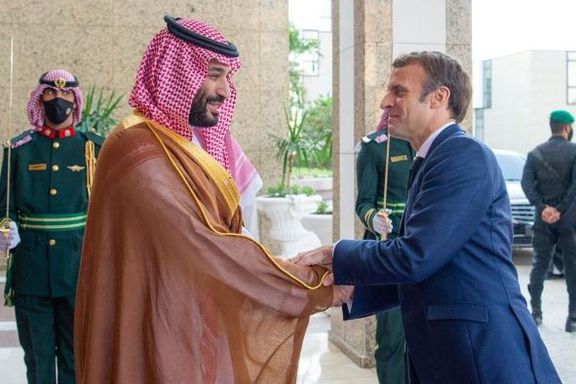
French President Emmanuel Macron has reiterated that regional states should be involved in talks with Iran to improve the chances of a nuclear agreement.

French President Emmanuel Macron has reiterated that regional states should be involved in talks with Iran to improve the chances of a nuclear agreement.
Speaking to reporters Saturday, Macron said it is important “to reengage a slightly broader dynamic and involve regional powers as well,” an added. “It is difficult to reach an agreement if the Gulf states, Israel and all those whose security is directly affected are not involved.”
It was significant that Macron mentioned Israel, that Iran has repeatedly threatened to destroy. Israel has also vowed never to allow Iran to acquire nuclear weapons.
The French president had said in January that Saudi Arabia and other regional powers should be part of talks to restore the 2015 Iran nuclear deal, JCPOA.
The United States and its three European allies, the United Kingdom, France and Germany that are negotiating with Iran in Vienna also want to address Tehran’s regional policy of supporting militant, proxy groups, but Tehran has flatly rejected any talks beyond the revival of the JCPOA.
Talks with Iran that resumed on November 29 adjourned on Friday without a success amid pessimism among Western countries who said that Tehran did not show any sign of being ready to reach a deal.

Nuclear talks over Iran's nuclear deal broke off until next week as European officials voiced dismay Friday at sweeping demands by Iran's hardline government.
Iran suspended talks in June after President Ebrahim Raisi’s election saying it needed time to form a new government, but it kept delaying its return, heightening suspicions among US and European officials that Iran is playing for time while advancing its nuclear program.
"Iran right now does not seem to be serious about doing what's necessary to return to compliance, which is why we ended this round of talks in Vienna," US Secretary of State Antony Blinken told the Reuters Next Conference.
"If the path to a return to compliance with the agreement turns out to be a dead-end, we will pursue other options," he added, without elaborating.
But the US has been making this threat for weeks, saying that it will wait for the new round of talks in Vienna to see if Tehran is serious.
Diplomats said the Iranian delegation had proposed sweeping changes to a text that was painstakingly negotiated in previous rounds and that European officials had said was 70-80% finished.
'DISAPPOINTMENT AND CONCERN'
"Over five months ago, Iran interrupted negotiations. Since then, Iran has fast-forwarded its nuclear program. This week, it has back-tracked on diplomatic progress made," senior officials from France, Britain and Germany said in a statement, adding that Iran was demanding "major changes" to the text.
It is "unclear how these new gaps can be closed in a realistic time frame", they added.
The three European powers expressed "disappointment and concern" at Iran's demands, some of which they said were incompatible with the deal's terms or went beyond them.
The 2015 agreement imposed strict limits on Iran's uranium enrichment activities, extending the time it would need to produce enough fissile material for a nuclear bomb, if it chose to, to at least a year from around two to three months. Most experts say that period is now shorter than before the deal.
Iran denies seeking nuclear weapons, saying it only wants to master nuclear technology for peaceful purposes.
After more than two years of Iranian adherence to the core curbs, however, then-President Donald Trump pulled the United States out of the deal in 2018, calling it too soft on Tehran, and reimposed painful US economic sanctions on Tehran.
Tehran retaliated from 2019 by breaching many of the deal's limits on enrichment and other restrictions, advancing well beyond them. With the deal's nuclear benefits now badly eroded, some Western officials say there is little time left before the foundation of the deal is damaged beyond repair.
French President Emmanuel Macron said he thought it likely the current round of talks would not succeed and appeared to look beyond them, hinting at involving more nations, such as Gulf Arab states, in a wider discussion if the Vienna talks fail.
"I think it's very difficult to find an agreement if the Gulf countries, Israel, all those whose security is directly affected, don't take part," he told reporters in Dubai. Macron had expressed the same stance last year.
FIRM STANCE
Iranian nuclear negotiator Ali Bagheri Kani's uncompromising stance is that since Washington left the deal, it should make the first move by lifting all sanctions imposed on Tehran since then, even those unrelated to Tehran's nuclear activities.
However, he left the door ajar for more talks by saying European nations could propose their own drafts for discussion, Iranian state media reported.
However, more talks would mean the talks stretching into 2022 as the holiday season approaches and more time for Iran to add to its stockpile of highly enriched uranium.
With reporting by Reuters

The top Iranian negotiator told state media Friday European sides can propose their own drafts for discussion, after they expressed dismay over Iran's demands at nuclear talks.
"There is no problem if the Europeans also provide drafts, and they can be discussed, but they must be based on principles approved by both sides," Ali Bagheri Kani, a deputy foreign minister, said according to the state broadcaster IRIB, before leaving Vienna.
Some European negotiators have reportedly said that what is included in Iran’s documents is nothing more than what had been agreed but not finalized five months ago. They added that Iran has still not answered some of the questions pending since the end of the first six rounds of talks in June.
Indirect US-Iranian talks on salvaging the 2015 Iran nuclear deal teetered on the brink of crisis on Friday as they broke off until next week.
US Secretary of State had said that by the conclusion of today’s meetings it should be clear if Iran is serious in the new round of talks.
CNN State Department correspondent Jennifer Hansler tweeted Friday that a State Department spokesman criticized Iran’s approach to the latest round of talks telling CNN that President Ebrahim Raisi’s administration “did not come to Vienna with constructive proposals.”
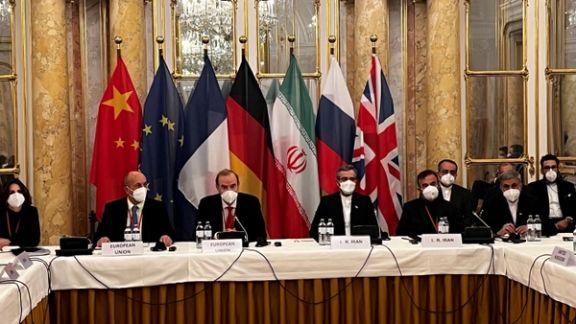
Hardliners in Iran have been trumpeting pessimistic ideas about the outcome of nuclear negotiations in Vienna all Friday as the first round of talks wrapped up.
Friday Prayer Imams took the lead in putting forward excessive demands such as calling for lifting all sanctions against Iran before starting to discuss the United States' return to the JCPOA framework.
On Thursday, Tehran news outlets quoted hardliners as claiming that the Iranian delegation has humiliated the US diplomats by not allowing them to join the talks and forcing them to listen to other negotiators from an adjacent room.
IRGC-linked Fars news agency carried comments by hardliner commentator Mohammad Marandi on pro-Iran Al-Mayadeen TV in Lebanon. Marandi is accompanying the Iranian delegation as an "adviser" who has been seen interpreting for the delegation as most of its members do not speak English.
Fars quoted Marandi as saying that Iran has a plan B in case the United States refuses to return to the 2015 nuclear deal (JCPOA). The plan, Marandi said, includes continuing the nuclear program and strengthening Iran's ties with Asian countries.
The only Asian country that continues any significant trade relations with Iran after the US withdrawal from the JCPOA in 2018 is China with whom Iran has signed a 25-year agreement for cooperation.
Marandi said that Iran is waiting for JCPOA partners to comment on the two draft documents Tehran put forward on Thursday. No official response has been observed on the part of the European trio and the United States and Russia and China to the drafts. However, French President Emmanuel Macron has said that this round of negotiations appears to have remained inconclusive and made no progress.
Thursday evening Russian negotiator Mikhail Ulyanov denied reports that the negotiations have failed to reach any positive results.
Meanwhile, Marandi told Al-Mayadin that Iran has yet a third draft that it has not presented to the JCPOA member states. He added that based on these drafts the US and European sides cannot accuse Iran of having excessive demands. Elsewhere in the interview with Al-Mayadin, Marandi acknowledged that "The European side has expressed its dissatisfaction with the drafts."
According to Reuters, Senior European trio (British, French and German) diplomats taking part in the talks expressed "disappointment and concern" Friday at Tehran's proposed alterations to a text that had been agreed on in previous rounds. "Major changes (have been) demanded (by Iran)," the officials said in a statement, adding that some were incompatible with the JCPOA, adding that it is "unclear how these new gaps can be closed in a realistic timeframe based on Iranian drafts," they said
Some European negotiators have reportedly said that what is included in Iran’s documents is nothing more than what had been agreed but not finalized five months ago. They added that Iran has still not answered some of the questions pending since the end of the first six rounds of talks in June.
Marandi wrote in a tweet: "The US/EU can't have their cake & eat it too. They can't expect the Islamic Republic of Iran to go back to 2015, yet they keep parts of their post-JCPOA sanctions regime intact. The new administration has made it clear that the barbaric Western maximum pressure sanctions must go."
Responding to Marandi's comment, Iranian-American analyst Ali Vaez wrote in a December 2 tweet: "This is why a diplomatic deadlock is the likeliest outcome in Vienna. Iran can’t expect a nuclear deal to unshackle it from sanctions aimed at non-nuclear policies. That is the definition of having your cake and eating it too."
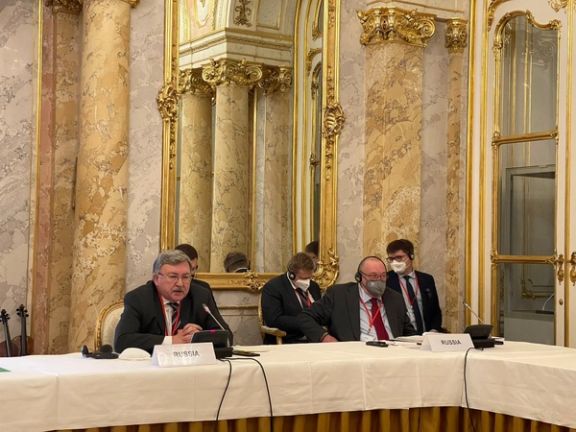
Diplomats negotiating in Vienna over reviving Iran’s 2015 nuclear agreement (JCPOA) will wrap up their first session of talks on Friday with a final meeting.
European and Iranian officials said they will hold a last formal session before adjourning. The United States is not a direct participant in the talks because it withdrew from the agreement in 2018 and imposed heavy sanctions.
The meeting of Iran, France, Germany, Britain, Russia and China is in a format known as the Joint Commission which has bookended previous rounds of talks. The Iranian official said the meeting would be held around noon (1100 GMT). The aim is to resume the talks next week, the European diplomat said.
On Thursday, Iran submitted two documents to the Commission members outlining its position on removing US sanctions and its own nuclear program. Diplomats said they will study Iran’s proposals.
Both Washington and Tehran sounded pessimistic on Thursday about the outcome of the talks, as each called on the other party to show goodwill.
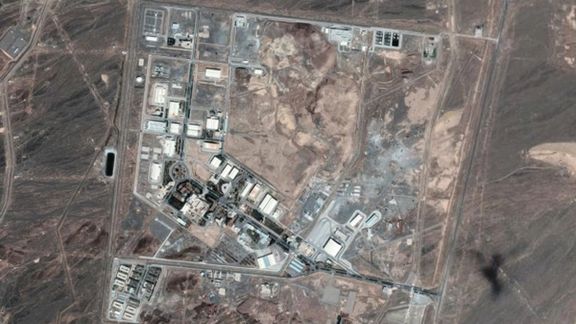
Israel used an Iranian network of agents to conduct sabotage operations against Iran’s nuclear facilities, a new report by The Jewish Chronicle said Thursday.
A large explosion in April that inflicted major damage to the Natanz uranium enrichment site was conducted by recruiting several Iranian scientists working in the complex, the report says. They smuggled explosives into the highly secure facility and at the chosen moment the explosion was triggered remotely.
The Jewish Chronicle (JC) says 90 percent of centrifuge machines enriching uranium were destroyed and the facility was put out of action for nine months. The scientists and people involved in the operation were evacuated from Iran and are in a safe place the report adds.
The Natanz incident rattled the Iranian leadership, because it was so large, they could not hide it, or claim it was a technical accident. The Islamic Republic heavily promotes an image of invincibility to keep control of its restive population and successful sabotage acts damage its image domestically.
Natanz was the target of an earlier attack in July 2020, when a sensitive building for manufacturing new centrifuges blew up. The JC report says that in this operation explosives were imbedded in construction material that Iran bought from Israeli agents and when the time came the Mossad pushed the button.
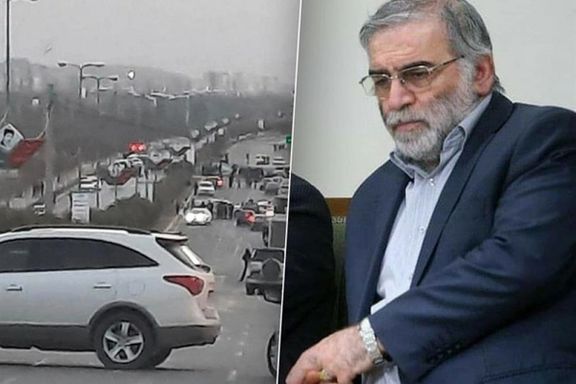
The spectacular assassination of a top Iranian nuclear and military scientist in November 2020 was another sabotage act widely attributed to Israel, when a remotely operated heavy rifle was placed in a van and opened fire at the car of Mohsen Fakhrizadeh, killing him on the spot, despite the presence of a team of bodyguards.
This led to mutual recrimination between security agencies but was particularly embarrassing to the Islamic Revolutionary Guard Corps (IRGC) which had the responsibility to protect Fakhrizadeh.
As the Biden Administration has been trying to revive the Obama-era nuclear agreement with Iran, abandoned by Donald Trump in 2018, Israel has become highly worried that Tehran will get maximum concessions from the US and keep its nuclear program intact. Israeli officials have repeatedly threatened in recent months to use military force if needed to deny Iran a nuclear option.